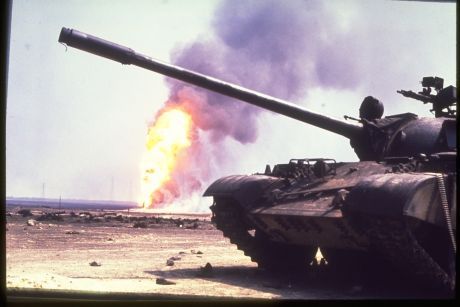Features
You are here
On Earth Day, say no to war

April 5, 2012
April 22 is Earth Day, which has become a global event raising awareness about the importance of environmental protection. Earth Day began in 1970 in the US, in the context of the Vietnam anti-war movement, and to protect the environment we need to end war and militarism.
War on the planet
War not only kills people, it also kills our planet. The US used the chemical defoliant Agent Orange (which Canada helped develop and test) in Vietnam to destroy the forest on which the resistance movement relied on for habitat, food and protection. Combined with carpet-bombing, this destroyed much of Vietnam’s forest, animal habitat and agriculture.
NATO bombing in Afghanistan has disrupted a major migratory thoroughfare for birds in the region, and contributed to deforestation. According to a 2003 United Nations Environmental Program report, war has contributed to “serious and widespread land and resource degradation, including lowered water tables, desiccation of wetlands, deforestation and widespread loss of vegetative cover, erosion, and loss of wildlife populations.”
Sanctions, no-fly zones and war on Iraq have undermined the water supply, soil fertility and animal habitat—reducing the country from the fertile crescent into a one that must now import the vast majority of its food. In addition, the widespread use of depleted uranium (which Canada mines and exports) has left radioactive waste for billions of years, contaminating earth and water. Meanwhile, Israel’s 2006 war on Lebanon intentionally caused an oil spill that contaminated the sea, killing countless fish and threatening the endangered green sea turtle.
War for oil, with oil
Oil is the lifeblood of the capitalist system, and wars and driven by, and often for, this unsustainable and polluting fuel.
To control the oil-rich Middle East, the West has armed Israeli Apartheid and Arab dictatorships, and in 1951 overthrew Iranian democracy when it nationalized oil. The emergence of Europe and Asia as imperial rivals to the US has produced wars for oil pipelines—from the Balkans war in the mid 1990s (for pipelines taking Caspian oil west, away from Russia), to the war on Afghanistan (for pipelines taking Caspian oil south-east, away from China), to the war on Iraq and threats against Iran and Syria (last year Canada’s SNC-Lavalin signed a contract to build a pipeline exporting Iraqi oil through Syria to the Mediterranean). As part of the new scramble for Africa, NATO attacked Libya (home to the largest oil reserves in Africa, and where Canada’s Suncor has oil operations), and the Kony 2012 campaign is building support for US troops in Uganda, where oil has recently been found.
All this death and destruction requires massive amounts of oil—to fuel fighter jets, battle ships, tanks, rockets and vehicles to carry the oil that fuels all these. The largest oil consumer in the world is the US military—which consumes almost 400,000 barrels per day, more than 80 per cent of the US government’s use—yet it is excluded from all climate treaties.
Message to Harper: No war, no warming
Capitalism is addicted to war and the oil it depends on, and Canada’s 1% are keen participants—from contributing to Agent Orange and depleted uranium, participating in wars (from the Gulf and Balkans war, to Afghanistan and Libya), and extracting tar sands oil that feeds the war machine.
Canada is a major exporter of oil to the US—including tar sands oil that goes to the Cherry Point refinery, the major west-coast supplier of fuel to the US military—and more oil will be consumed by Harper’s new fighter jets and battleships, and war on Iran or Syria.
While Harper pours billions into militarism he is slashing environmental protection programs, and these go hand-in-hand: global warming will melt more glaciers and open up more of the Canadian north to mining and militarism.
Individual actions are not enough to protect the environment. On Earth Day, let’s commit to ending war and its assault on the planet. In Canada this means stopping war on Iran and Syria, ending the occupation of Afghanistan, diverting military spending into social programs, and shutting down the tar sands while investing in green jobs.
Building these movements can also raise our horizons about a world without war and global warming, where we can live sustainably, and in peace, with the planet.
Section:
Topics:
- Log in to post comments









